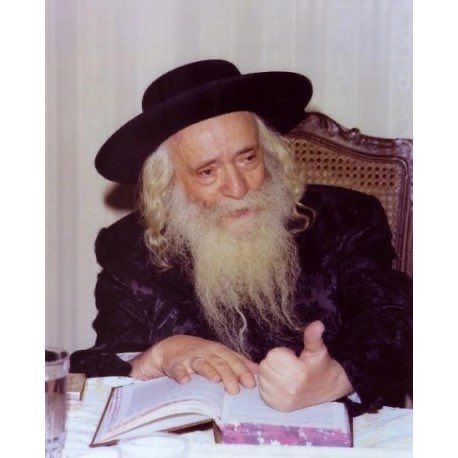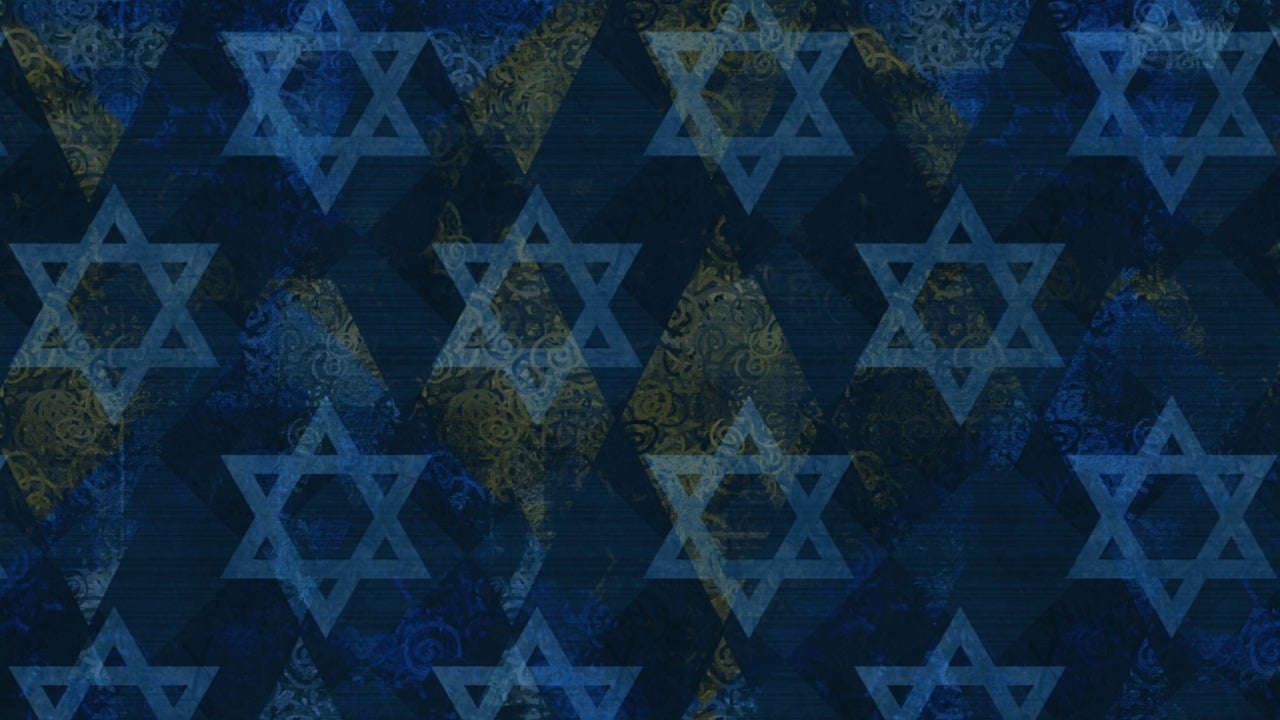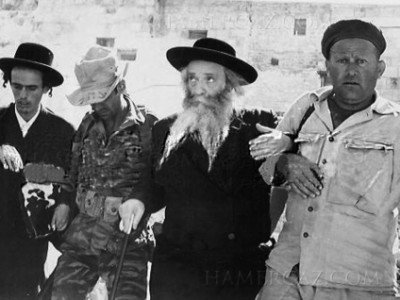This discourse was delivered by Rabbi Yekusiel Yehudah Halberstam, the holy Rebbe of Sanz-Klausenburg, of blessed memory, during his address to the communities of Israel in the year 5749 (1988-1989). How fitting are these words to illuminate our path in our turbulent and ever-changing era:
G-d Alone is Our Redeemer
It seems plausible, and indeed, close to the truth, that the sacred scriptures, at the beginning of the Egyptian enslavement narrative (Exodus 2), reveal: “And it came to pass in those many days that the king of Egypt died, and the children of Israel sighed because of the labor, and they cried out, and their cry for help from the labor went up to G-d. And G-d heard their groaning, and G-d remembered His covenant with Avraham, with Yitzchak, and with Yaakov. And G-d saw the children of Israel, and G-d knew.”
A profound question arises: How could Moshe, our great teacher, initially express reluctance, asking, “Who am I that I should go to Pharaoh, and that I should bring the children of Israel out of Egypt?” He even questioned, “What merit do the children of Israel have that a miracle should be performed for them?” Many explanations and interpretations have been offered, but since scripture cannot deviate from its plain meaning, it appears that even though Moshe saw and understood the immense suffering in Egypt—and perhaps even fasted and stirred the heavens—the Torah does not explicitly recount these actions, choosing to conceal them.
This brings us to a major question that earlier commentators grappled with: Why is Moshe’s name not mentioned at all in the Passover Haggadah, despite his central role in the Exodus? The answer lies in emphasizing that our redemption and the liberation of our souls came solely from the Almighty. No one else had a part in it. All praise and thanksgiving belong to G-d alone. He is a compassionate and gracious G-d, “the L-rd is close to all who call upon Him, to all who call upon Him in truth.” When we cry out to Him, “Help us, G-d of our salvation,” He answers.
This understanding is reflected in the Talmudic discussion (Pesachim 116a) where Rav Nachman asks his servant, Daru, about a slave freed by his master who also received money and gold. What should the slave say? Daru replies, “He should give thanks and praise [to his master].” Rav Nachman then says, “You have absolved me from having to say ‘Why is this night different?'” This anecdote illustrates that when the master (G-d) performs the entire act of liberation, the gratitude is directed solely to Him, not to any intermediary.
The Path to Future Redemption
We must deeply internalize that we have someone to lean on, someone to rely on! Jews! In a short while, in just a moment, these times will pass, and G-d will be with us. He is our Savior, and He will save and redeem us again, showing us His mercy once more, in the sight of all living beings, saying, “Behold, I have redeemed you, the end is like the beginning.” Let us not fall into despair or sadness, thinking that Yaakov is small and weak, and there is no one to arouse mercy for us. We must remember that we are no worse off than the Jews in Egyptian exile.
This introduction serves to highlight the dictum of our Sages: “The actions of the forefathers are a sign for the children.” As Ramban explains (Genesis 12:6), everything that happened to our forefathers serves as a blueprint for what will happen to their descendants. As the wisest of all men (Ecclesiastes 1:9) stated, “What has been will be again, and what has been done will be done again; there is nothing new under the sun.” The first redemption was the Exodus from Egypt, followed by redemption from the four exiles, and the final redemption will be from the wicked kingdom of Edom.

Based on this, the verses in Exodus (Parshat Bo) “And the L-rd said to Moshe, ‘Come to Pharaoh'” can be understood. It does not say “Go,” as it did initially with the plague of blood, but “Come,” implying, “I am going, and you, Moshe, come with Me.” “For I have hardened his heart and the heart of his servants” – meaning, I deliberately hardened their hearts “in order that I may place My signs among them.”
The Torah teaches us through these verses that the “Night of Watching” (Leil Shimurim) is for the Creator of all worlds alone. He acted from beginning to end, and only He brought them out of Egypt. This is why it says (Exodus 12:41), “And it came to pass at the end of four hundred and thirty years, and it came to pass on that very day, all the hosts of the L-rd went out from the land of Egypt,” because it was “a night of watching for the L-rd to bring them out from the land of Egypt.”
Hope in the Darkest Times
Our Sages established that “the son of David (Messiah) will not come until they despair of the redemption” (Sanhedrin 97a). The redemption will surely come when no one believes they are worthy of it, when they question what they have done or if they have truly repented. Then, do not be surprised, for the Redeemer will come to Zion. Who is greater than Moshe, the faithful shepherd, who questioned by what merit the Israelites would be redeemed? Therefore, we should not be surprised if, in our time, both old and young wonder by what merit we will be redeemed. We must know that this is G-d’s will. Just as on that night, they were redeemed solely by G-d’s will, without any discernible reason, so too is the “Night of Watching” for all the children of Israel for all generations. In the future redemption, the same scenario will repeat itself as in the Exodus, for “what has been will be again, and there is nothing new under the sun.”
Rashi explains “Leil Shimurim” (Night of Watching) as the night G-d promised Avraham He would redeem his descendants, and a night protected from harm. There is a known dispute between Rabbi Yehoshua (redemption in Nissan) and Rabbi Eliezer (redemption in Tishrei). Rashi, however, cites Rabbi Eliezer, perhaps because in the future, with the coming of Messiah, the Halakha will be established according to Rabbi Eliezer, meaning the Messiah will come in Tishrei with the sounding of the great shofar.
Our trust in G-d is firm, for precisely because we are in such a time, a poor and destitute generation, G-d will look upon the affliction of His people and gaze down upon our lowliness. He remembers us, for we have no one to offer rebuke that truly penetrates the heart, as Rabbi Elazar ben Azariah said, “I am amazed if there is anyone in this generation who knows how to rebuke” (Arachin 15b). We lack the holy righteous individuals like the Baal Shem Tov and Rabbi Dov Ber, the luminaries of generations. There is no one who knows what to say or has the power to say it. Therefore, G-d Himself must come to see and hasten our salvation in the blink of an eye.
This is alluded to in “Leil Shimurim” – a time will come when there will be deep, dark night, with barely any light breaking through. Precisely then, we will know that “the watching is for G-d” – G-d alone will bring us out. He alone will say to His beloved children, “I have surely seen the affliction of My people,” and “Comfort, comfort My people, says your G-d.” He, blessed be His Name, will comfort us alone, even if no creature or angel in the world advocates for the children of Israel. For from eternity to eternity, the children of the living G-d are assured that “you are children to the L-rd your G-d,” and “children do not lie.” This will be our comfort, this knowledge will give us strength to persevere, even if, when we look around, the tribulations of the time and situation lead us to think that hope is lost. Nevertheless, through these words, we will strengthen and encourage ourselves.
In our era, it is good to repeatedly recall the famous saying of the holy Rabbi Nachman of Breslov, of blessed memory: “Before the coming of Messiah, it will be so difficult to be a believing Jew in the thirteen principles of faith, like walking on a slippery wall.” He clarified that he did not mean understanding the profound depths of these principles as understood by great righteous individuals, but simply believing in the literal meaning of the words. He said this because when such a generation arrives, and great darkness spreads over the world, leaving nothing to cling to, then perhaps Jews will say to one another: “Do not be amazed, do not fear, the world is not lost, G-d forbid, and this is how it must be. As a sign, they will say, ‘Long ago, Rabbi Nachman said it would be so,’ and with this, Jews will be encouraged and sustain themselves.”
Even if Jews wander like tumbleweed, without mercy, and even if ignorance and foolishness increase immeasurably, G-d remains their refuge, and there is no other. We are assured by prophecy that “as a shepherd seeks out his flock on the day he is among his scattered sheep, so will I seek out My sheep and rescue them… I will feed My flock.” And Amos’s prophecy (3:12) will also be fulfilled: “As a shepherd rescues from the mouth of the lion two legs or a piece of an ear, so shall the children of Israel be rescued.”
From this, we learn that even if, G-d forbid, Jews behave improperly, no one from the seed of Avraham, Yitzchak, and Yaakov ever truly abandons their faith. This is clear: could Jews not have easily saved themselves during times of distress by accepting “conversion certificates” from priests? Could they not have easily become like all other nations? Even today, can they not assimilate and, G-d forbid, convert? No, this is not the inheritance of G-d’s servants. The Holy One, blessed be He, in His abundant mercy and kindness, watches, observes, and hears our cry: “For Your sake we are killed all day long; we are considered as sheep for the slaughter.” A Jew, in whatever state they may be, whether they observe all the Torah’s commandments or only a few due to a lack of understanding, nevertheless, the “For Your sake we are killed all day long”—the “Jewish spark” dwelling deep within every heart—cannot be taken from them. In every situation, they rely and believe only in G-d.
On one occasion, during a meeting in Israel with a secular leader, I told him: “I am confident that you will agree with me that you, too, have faith in G-d. If you did not have faith, I am sure you would have fled long ago, for I find it difficult to understand how you, who are aware of the security situation in Israel and truly know the danger facing the state and its inhabitants, how you do not save yourself? You see the ship burning, why do you not jump off? Especially since there are other ships nearby that you could jump onto. If faith in G-d did not dwell within you, you would have fled long ago.” He listened to my words, turned pale, and nodded his head in agreement with confusion.
The words of the holy Ohr HaChaim were a true prophecy, for in his great holiness, he foresaw what would happen in the world, even more than what our eyes witness today. “The Rock is their refuge.”
Readiness for Redemption
The anticipation of redemption should be exactly like someone standing in the last hour before dawn. Even if it is still pitch dark outside, they know with certainty that soon the light of day will break. So too, we must believe that morning has arrived, and the redemption will come immediately. Today, all the “deadlines” (of exile) have passed. We must internalize this for ourselves, our children, and every Jew: the more we perceive the darkness to be great and the forces of evil to be dominant, the clearer it becomes that the end of exile is near. It is a known principle that a candle’s flame leaps upwards and shines brightest just before it extinguishes. Similarly, the fact that impurity is surging and raising its head is a clear sign for us that it will soon diminish and be subdued.
We are witnessing special times now, and every Jew must be ready and prepared for the moment of redemption. If our Sages already said that a Kohen (priest) should not drink wine even now, lest the Temple be rebuilt and the service become weighty (Ta’anit 17a), then in our days, our anticipation should certainly be many times greater. At this time, we should not focus on the actions of sinners and wicked individuals, whether they have sinned or not; Messiah must come. Do not let yourselves be swayed by the idle talk of those who find various excuses, claiming that Messiah is not coming because of these transgressors or those sins, for to become a disbeliever, G-d forbid, can happen in an instant. Rather, instill in yourselves true faith, knowing with absolute certainty that “for Your salvation we hope all day long,” and we await salvation.
The events that have befallen us this year cause us to ask what the end will be. But by the great mercy of G-d, when we see that all the prophecies have already been fulfilled, we are all strengthened, encouraged, and await for just a moment longer, for behold, Messiah stands behind our wall. Jews! Do not tire! Wait a little longer, for our salvation is near. Let us stand at the gates and anticipate, for perhaps the flame of the candle (of redemption) is already here before Messiah has even arrived.
My advice to every intelligent person is to prepare and pack a bundle of matzah and some cooked meat, for surely Messiah will come suddenly, and we will be surrounded by clouds of glory that will take us to the Land of Israel. Perhaps there will not be enough time to bake matzah then. Therefore, it is advisable to be prepared in advance, and also to acquire new clothing in honor of the holy city of Jerusalem, in honor of the Holy Temple, and in honor of the Passover offering.
This is true of the prophecies revealed to us. For if our holy prophets had not hinted to us what would happen in the End of Days, the children of Israel might, G-d forbid, fall into unwitting despair. If we had not learned the words of the Radak and the holy Ohr HaChaim mentioned above, then the troubles would have caused us to question. This is like the analogy of a patient who receives a miraculous medicine that causes severe, sharp pains throughout his body for a day, and then sweats profusely, but is guaranteed to fully recover. The family, prepared for these side effects, was not alarmed but eagerly awaited the day of the pains, knowing it was a prelude to recovery. If the doctor had not warned them, they would have cried out in despair. But knowing, they accepted it with joy.
Indeed, every individual must take personal stock at this time. Each person, individually, needs special protection within the entire community. It is incumbent upon each one to change their ways for the better and to increase their holy service. Holy children of the living G-d, let us accept upon ourselves the path of Torah study, to cast off and abandon the idols of silver and gold, and to accept upon ourselves to learn, observe, and perform all the words of the Torah with love. Let each person say to their friend, “Be strong!” and awaken them: “Do you not see and understand the situation we are in, and who knows what tomorrow will bring?” Let us not delude ourselves with the advice of false prophets who say, “No evil will befall us.” Rather, stand up, entreat the presence of the Most High with prayers and supplications, that He who said “Enough!” to His world will say “Enough!” to our troubles. In these days, let us increase our strength in Torah study, and through increasing Torah and prayer, let us learn another page of Talmud, another chapter of Mishnah, another psalm of Tehillim, and awaken the aspect of “On that night, the sleep of the King, the King of the world, was disturbed.”
May the Almighty help and gather all the dispersed of Israel. Every Jew, wherever they may be, He will bring and draw near to Him, and bring them out of physical and spiritual servitude. And upon all of them, He will pour out a spirit of repentance and purity, and remove the spirit of impurity from the land. May the Almighty help us to be redeemed this very month with an eternal redemption, speedily in our days.
This is why we mention the hymn “Chad Gadya” in the Passover Haggadah, as it relates to the omission of Moshe’s name. For this is our encouragement and strengthening in this time, even when we do not have Moshe, these holy Torah scholars – it is as if you say, “Moshe spoke well” – and we have no one to stand up and rebuke, no one who knows what is happening in the world, and no one to listen to. Now is the time for the Redeemer to come to Zion and to those who return from transgression in Yaakov…
In our days, we are already past all the stages alluded to in “Chad Gadya.” And whoever G-d has graced with knowledge and understanding will realize this in all its elements: the cat, the dog, the stick, the fire, the water, the ox – for they are signs of the periods of Israel’s exile. And today, even the Angel of Death has “slaughtered the slaughterer” who still remained. We no longer have prophets or sages, and there is nothing more for him to harm. And now is the time when the Holy One, blessed be He, will “slaughter the Angel of Death,” and we shall remove worry from our hearts, for G-d is with us.





